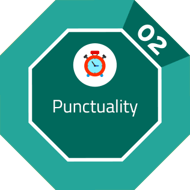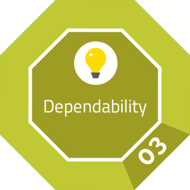3 Tips For Developing More Reliable and Committed Employees
Author
Heath O'Leary
 There are several reasons why individuals may not be dependable or aren't consistently meeting work commitments.
There are several reasons why individuals may not be dependable or aren't consistently meeting work commitments.
The first step to addressing this behavior is to have an open conversation with the individual, asking them what is preventing them from meeting commitments and deadlines. Their answers will help you focus your coaching.
Below are tips to address three common causes of the dependability gap.

For people who procrastinate, it is often not just a problem of time management or planning that contributes to this tendency, but rather something that is internalized.
Offer the following ideas to someone who is putting off a project or task:
- For many of us, procrastination is a maladaptive lifestyle. To change these behaviors, you have to change your lifestyle; that means change behaviors in all domains of life, not just work. If you start making changes outside of work, changes inside of work will follow. For example, don’t put off that Dentist appointment, cleaning out the garage, or taking the car in for repair.
- Procrastinators tell lies to themselves such as “I’ll feel better about this tomorrow,” or “I work better under pressure,” or “This can wait, it’s not that important.” Better to tell yourself the truth, such as “ Getting this finished takes off some pressure, “It’s important that this gets finished.”
- Be aware that procrastinators look for distractions (e.g., checking email) to avoid that challenging task or project.
- Think about how you will feel when you finish the project—probably a sense of accomplishment, pressure relief, and so forth. Visualize how you will feel and what you will be able to do when you are done.
- Tell yourself you will work on a task for thirty minutes. When the time is up, you can evaluate if you want to continue or not— but momentum will likely kick in and you will likely finish up or continue.
- Reward yourself for small milestones; such as when you finish the introduction on a white paper, you can have a coffee break.
- Set up a personal penalty system—and stick to it. For example, if you revert back to old procrastinating behaviors, then you will have to stay late to make it up.

A lack of conscientiousness can sometimes result in attendance and punctuality problems. If someone needs to improve in this area, work with them to evaluate what they think the causes are for their lack of punctuality or attendance by asking the following questions:
1. Is the attendance issue a pattern or an isolated incident?2. Does the company condone this type of behavior?
3. What are the causes of the absence behavior? Answer the following questions:
- Is it a health or life style factor? (e.g., illness, alcohol use, stress, burnout)
- Is it due to attitudes about where they work or what they do? (e.g., job satisfaction, loyalty to the company)
- Is it a workplace factor? (e.g., travel time, excessive hours, parking issue)
- Is it a domestic factor? (e.g., work‐life balance)
Help them identify which causes are under their control and come up with ways to address it. For example, they could leave earlier to deal with traffic or parking issues, schedule a personal day to deal with burnout or stress, or talk about changing their job duties or responsibilities.

To help someone become more reliable, dependable and follow through on commitments, offer the following simple ideas:
- Use an activity log to keep track of what you do and how long it takes. Identify where you are wasting time, when you are most productive, and schedule your work accordingly.
- To be more efficient, try clustering tasks (e.g., return all phone calls and emails once or twice daily)
- Develop to‐do lists everyday and prioritize your tasks. Do the challenging tasks first and don’t make it a habit to stop working on one task to handle another.
- Set regular update meetings during the course of projects to review progress of assigned tasks and to ensure that goals are being met.
- Do a post mortem evaluation when you finish a project to examine the quality of your work and if time commitments were met satisfactorily.
- Use planning tools to help you get more organized (e.g., Microsoft Project, Gantt charts).
- Take time every Monday to plan your deliverables for the week.
Develop skills like Conscientiousness - Provide the feedback and learning resources your employees want and need.
The ThinkWise 360˚ Survey gives your employees a clear picture of their strengths and opportunities for improvement and links them directly to learning resources. Your employees will be more engaged in their own development and you'll create an alignment between the organizational strategy and vision and your people.
Click the button below to download a 360˚ survey sample report to see how easy developing your employees can be.
